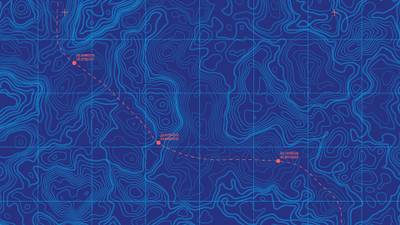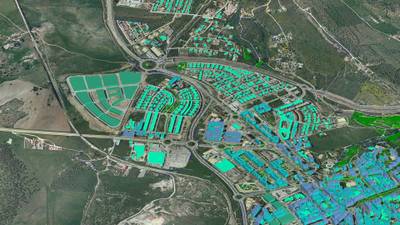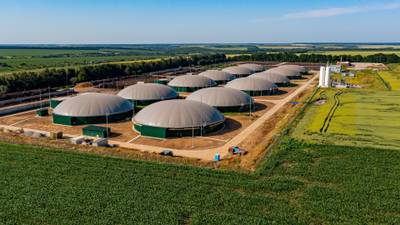Find new ways to power our planet.
Ready yourself for career success in renewables. Join our triple-accredited online MSc.
It gives you a much broader learning experience than many other Masters degrees in renewable energy.
You’ll train as an engineer in all major renewable energy sources, including:
- geothermal
- solar
- biomass
- hydro
- marine
- wind.
You’ll learn to design, build and optimise the renewable energy infrastructure of the future.
You’ll cover the theoretical knowledge and advanced technical skills you need as a renewables engineer. But you’ll also focus on the wider legislation, planning and economics of renewables. You’ll graduate ready to run green energy projects safely, to budget, and on time.
Who can study online MSc Renewable Energy Engineering
You can apply for this distance-learning degree if you have a background in any branch of Engineering, or in Physics, Maths or Chemistry.
You can also study this degree full-time on campus.

Fits around full-time work
This degree fits around full-time work, with flexible hours and 24/7 study access.

You’re in expert hands
We’ve been delivering online and distance learning for decades.

20% alumni discount
University of Aberdeen alumni receive 20% off fees for this online degree.

Accredited online degree
This online MSc is accredited by the:
What you’ll study
You can choose to study for a:
- Masters (180 credits)
- exit early with a Postgraduate Diploma (120 credits)
- exit early with a Postgraduate Certificate (60 credits), or
- start with one of the short courses that make up this degree (15 credits).
You can build your way to a qualification one short course at a time.
How you’ll study
Online learning
This distance learning MSc in Renewable Energy Engineering is delivered flexibly, 100% online.
You can learn with us anywhere in the world, no student visa required, and set your study hours to suit you.
Your teaching
Teaching is delivered through MyAberdeen, our online Virtual Learning Environment (VLE). It holds all the materials, tools and support you’ll need in your studies. Take a look around MyAberdeen.
You can access your learning materials on computer, smartphone and laptop, 24 hours a day. You’ll find a range of resources available, including online access to our award-winning Sir Duncan Rice Library.
Your tutors
This degree is delivered by our School of Engineering.
You’ll learn from an international team of research-active engineering staff, as well as industry professionals. These include highly experienced engineers and tutors from our Centre for Energy Transition, who have worked on major renewable energy projects around the world.
Industry input
Your degree is designed with and supported by an Industry Advisory Board. This panel of experts from across the renewables sector ensures your degree content is always current and informed by the very latest industry needs and developments.
Your peers
This degree attracts students from around the world, all sharing a common interest and passion for renewable energy. You’ll be joining a close-knit community, working together across major projects, gaining international insights and building your global network.
This degree is assessed online.
We’ll use a range of online assessment methods throughout your studies. These may include:
- written coursework
- online tests
- reports and projects.
Hours for taught courses
If you plan to study part-time, we recommend you take no more than 30 credits per term. Students typically take one or two 15-credit short courses per term.
15 credits
- Around 150 hours of study and assessment time to complete.
- You’ll study 10 – 15 hours per week per term, plus more at assessment times.
30 credits
- Around 300 hours of study and assessment time to complete.
- You’ll study 20 – 30 hours per week per term, plus more at assessment times.
This is an indicative guide to the time required for a typical student at this level to achieve the learning outcomes. This includes time for independent study, as well as teaching and assessments.
You can largely set your own study hours each week to cover the materials. MyAberdeen is available 24/7, so you can log in and study when it suits you.
Activities at fixed times
Some activities will be scheduled for fixed times, such as online meetings with your tutor or assessments with deadlines. But otherwise, you can access and work through each course at your convenience.
Hours for 60-credit projects and dissertations
A 60-credit project or dissertation is around 600 hours of study time.
This is around one term of full-time study.
You can dedicate a full term to your project or dissertation and work on it full-time. Or you can complete it part-time, spreading the hours you dedicate to it over two terms.
When you study with us, you can expect a first-class support structure so that you’re never alone in your studies.
But learning online does mean you have to motivate yourself and manage your own time.
Your most important commitment will be time – the time to work through, reflect on and understand your teaching materials.
Before you start a course that involves a high degree of independent study, we recommend looking at the time you will be able to devote to your studies each week:
- Be realistic
- Create a weekly schedule as a guide
If you have any questions about studying online, get in touch with our friendly team. We’re here to help.
Our first-class support structure will ensure that you aren’t alone in your studies. You’ll have contact with your tutors via MyAberdeen and email. You can use social media and discussion boards to chat with your fellow students too.
We provide a wide range of services to support you in your studies and beyond:
- Careers and Employability Service – including one-to-one advice sessions
- Disability support
- IT support
- Library support
- Student Support Service – help with finances, stress, wellbeing and non-academic issues
- Student Learning Service – study support, with advice sessions available via phone or Skype
- Aberdeen University Students’ Association (AUSA) – run by students for students
- Toolkit – clever apps and free training that can make your study life easier
Wherever you are in the world, you’ll feel part of our very special Aberdeen learning community.
We’re a member of the Access scheme run by the Society of College, National and University Libraries (SCONUL).
Access study spaces, books and journals in your area
The SCONUL Access scheme allows you, as a University of Aberdeen student, to access books and resources at university libraries across the UK and Ireland, or visit them for a quiet place to study.
You’ll be able to use study spaces, books and journals at over 150 university libraries which belong to the scheme.
Your support team
Our friendly team are here to answer any queries you have before, during and after your studies.

Professor Davide Dionisi
Davide is the degree coordinator. He’ll be on hand to answer any questions about degree content before you start and to help you throughout your studies.

Lyn Magee
Lyn is part of the School’s administration team. She’ll be there throughout your studies to answer any of your non-academic queries.

Get in touch
The online education team is here to answer any questions you have right now about this qualification, or about studying online.
Ask us a questionWhere this will take you
Your accredited MSc in Renewable Energy Engineering
You’ll graduate with an accredited MSc in Renewable Energy Engineering from the University of Aberdeen, one of the UK’s six ancient universities.
You’ll receive exactly the same degree qualification online as you would on campus. Your degree title will not mention online or distance learning.
Your MSc qualification and training will be recognised by employers and educational institutions around the world, opening up international opportunities.
Careers
This accredited degree will prepare you for career success in the renewable energy sector.
You’ll graduate with the extensive knowledge and skills you need to work on renewable energy projects across the world.
As well as strong technical skills, you’ll confidently possess the commercial and project management skills needed to run projects safely, on time and to budget.
Roles you’ll be ready to take up include:
- Energy and Sustainability Adviser
- Project Engineer
- Renewable (Sustainable) Energy Consultant, Specialist or Researcher
- Risk, Safety and Environmental Engineer
- or pursue a PhD in Renewable Energy and an academic career.

Lifelong career support
Our career support doesn’t stop when you graduate.
You have access to our free careers service while you study, and beyond.
- 1:1 appointments
- CV checks
- Interview prep
- Job opportunities
Fees and funding
The fee quoted above is based on you starting your studies with us in the 2024/25 academic year.
We have confirmed that our fees will rise by 5% for the 2025/26 academic year. Our indicative cost includes a 5% fee rise each year.
Pay as you go
This is a pay-as-you-go degree.
You do not have to pay the full tuition fee upfront.
You can spread the cost and pay as you go, term by term.
How it works
- You decide how many credits to study for each term.
- At the start of term, you pay only for the credits you’re taking that term.
- This gives you control over your costs and workload for each term of your degree.

Your personalised cost breakdown
Use the degree scheduler to plan your studies and see your cost breakdown, term by term.
Learning resources
Access to all the essential books and resources you need are included in your tuition fee. They’ll be made available to you online and you do not have to buy your own copies.
We also provide optional recommended reading lists. Many of these resources are available electronically through our library, although purchases may be required if you wish to read the full list.
Printing
You may want to set aside a small budget for printing, depending on how you like to work.
There are several ways you may be able to get help funding your studies:
- Employer sponsorship – we accept full and partial fee payments from sponsors
- Student loans
- Scholarships – search our funding database for scholarships
Find out more about funding options.
Student card
All our students are entitled to a University of Aberdeen student card. This gives you access to a range of student discounts around the city and online.
20% Alumni discount
You’re entitled to 20% off our postgraduate taught degrees and short courses if you have a degree from the University of Aberdeen. View Alumni discount details.
How discounts work
Discounts are applied during your application process. You can only use one discount per application.
I chose Aberdeen because of the programme content. I researched all UK universities and Aberdeen was the only one that had a renewables programme with a strong engineering focus.
Jorge Daniel Sanchez Thierry, MSc Renewable Energy Engineering graduate, Mexico
Entry requirements
MSc
- 2:1 (upper-second) UK honours degree (or equivalent) in any branch of Engineering, Physics, Maths or Chemistry, or
- 2:2 (lower-second) UK honours degree (or equivalent) in any branch of Engineering, Physics, Maths or Chemistry and at least two years’ relevant experience.
Key subjects you must have covered: Mathematics.
These are our minimum entry requirements. They are given as a guide and do not guarantee entry.
Short course route to online MSc Renewable Energy Engineering
If you prefer to start with a short course, you may be able to use our online short courses as a route into this degree.
Find out about our short course route to entryEntry requirements
We welcome students from all over the world.
See the minimum entry requirements above. If you do not have qualifications from the UK, check equivalent qualifications from your country.
Visa requirements
You do not need a student visa to study online with us.
English language requirements
Teaching is delivered in English.
If English is not your first language, use our English requirements checklist to see if you need to provide evidence of your English language skills when you apply.
English language tests and scores
If you do need to provide English language test scores, these are the tests and minimum scores we accept for this course or degree.
These are our Postgraduate Standard requirements.
IELTS Academic, IELTS UKVI Academic, and IELTS Online (not IELTS Indicator or IELTS General Training)
- 6.5 overall
- 5.5 for listening, reading and speaking
- 6.0 for writing
TOEFL iBT and TOEFL iBT Home Edition
- 90 overall
- 17 for listening
- 18 for reading
- 20 for speaking
- 21 for writing
- TOEFL DI code is 0818
Cambridge English: B2 First, C1 Advanced, or C2 Proficiency
- 176 overall
- 162 for listening, reading and speaking
- 169 for writing
LanguageCert Academic/LanguageCert Academic SELT
- 70 overall
- 60 for listening, reading and speaking
- 65 for writing
LanguageCert International ESOL B2 Communicator (Written and Spoken) – Online / In-centre
- Overall High Pass
- 33 for listening, reading and speaking
- 38 for writing
Oxford ELLT Digital – English Language Level Test Online
- 7.0 overall
- 5.0 for listening, reading and speaking
- 6.0 for writing
PTE Academic (online test not accepted)
- 62 overall
- 59 for listening, reading, speaking and writing
Duolingo – tests taken from 1 July 2024 onward
- 120 overall
- 95 for listening, reading and speaking
- 105 for writing
University of Aberdeen English Pre-sessional Programme (PSE)
- Pass
- Valid for one year. Refresher can be offered if out of date
Pre-sessional academic English preparation programmes undertaken at other UK universities
- Pass at an equivalent of 6.5 (C1)
- B2 in all four skills
- Certification must be within one year prior to the start of your course
For full information about language requirements, see our English Language Requirements page.
You apply through our online Applicant Portal. It allows you to upload relevant qualifications and documents.
What you need to apply for this degree
- Degree transcript
- Personal statement
- Degree certificate
- CV / Resume
Apply now
Start with our step-by-step guide. It explains degree transcripts, what to write in your personal statement and how to use our Applicant Portal.
You can apply to start in either September or January.
Apply as early as you can. This is so we have time to review your application and get a decision to you. We also want to ensure you have time to enrol before teaching starts.
September 2024 intake
For our September 2024 intake, the application deadline is 8 September 2024.
You will need to accept your offer and provide any outstanding documents to meet the conditions of your offer by 15 September 2024.
Teaching starts on 23 September 2024.
January 2025 intake
Teaching starts on 27 January 2025.
Application deadlines will be announced in due course.
You will need access to:
A computer (PC, laptop or Mac) operating on either:
- Windows 10 or later
- macOS 10.15 (Catalina) or later.
Most teaching materials are smartphone- and tablet-friendly. But we recommend a proper laptop or desktop for completing assignments comfortably.
Reliable internet access
We recommend:
- a wired connection
- a minimum download speed of 2 Mbps so you can take part fully in live sessions.
Speakers or headphones
- We recommend a headset with built-in microphone and earphones if you’re likely to study in an environment with background noise.
- A webcam is optional, but you may like to use one for some interactive sessions.
Software
We’ll give you access to Office365 applications. This means you can use online versions of Microsoft Word, Excel, and PowerPoint and install these programs on up to five personal devices.
If your course requires specialist software, we’ll provide you with access to this and a licence that lasts throughout your studies.
See our detailed IT requirements for more information.
Try our degree scheduler

Choose your courses
See all the courses that are part of this degree and choose what you want to study.

Manage your study schedule
Control the pace and cost of your degree. Decide how much you want to study each term.

Save to your wishlist
Save your schedule to your wishlist so you can view and edit anytime.
Master of Science
180 credits
£14,110
This indicative cost is based on 180 credits of study over three years, starting in September 2024.
Apply for this programme
- Start month
- September or January
- INDICATIVE COST
- £14,110
This indicative cost is based on 180 credits of study over three years, starting in September 2024.
Apply via our Applicant Portal
















